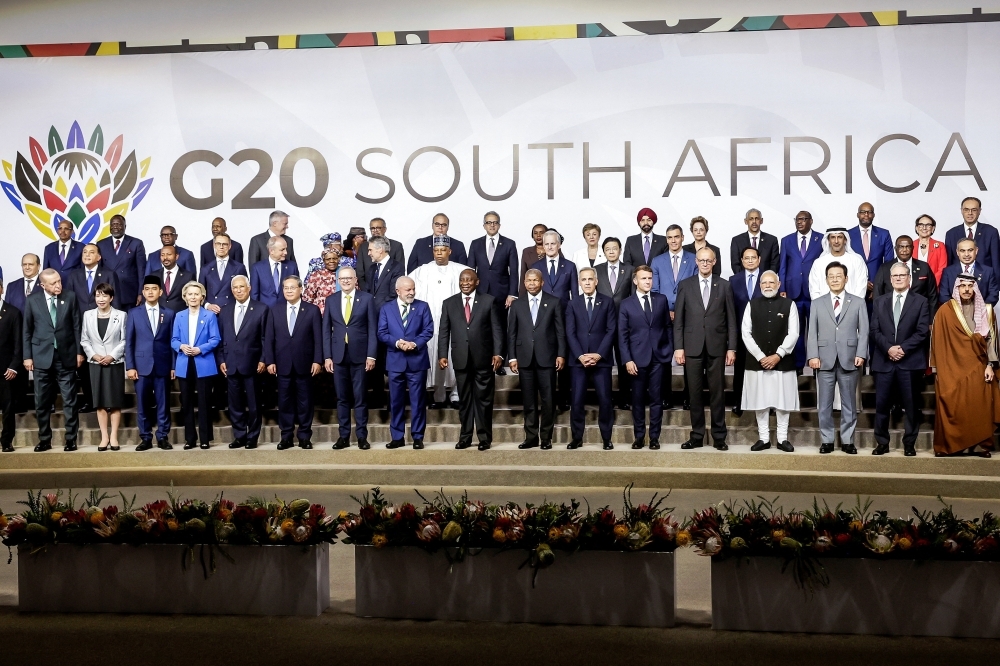Alwaght- The US decision to boycott the G20 summit in South Africa made one of the most controversial diplomatic moves of recent months.
On the surface, Washington justified its boycott of the summit of the world's biggest economies with its argument of the genocide against the white people of South Africa, an allegation the US President Donald Trump in recent months has talked about multiple times.
In the first look, this narrative looks like a moral standing in defense of the human rights, but when we look deeper, we can see that the issue is more about politics than human rights, having its roots in the American home politics, geopolitical competitions, and calculated use of the identity narratives.
The combination of these three aspects gives a clear picture of this confrontation and demonstrates how the battle over human rights concepts has become a game lever in the power play.
1. Genocide accusations: What is the reality?
Washington justifies its boycott of the summit by claiming a "genocide" is occurring against white South Africans. However, this charge bears no resemblance to the international legal definition of the crime.
Under the UN Genocide Convention, genocide requires a state or group's intent to destroy, in whole or in part, a national, ethnic, racial, or religious group. No credible legal authority or international institution has found evidence of such intent or actions in South Africa.
Modern South Africa is a constitutional democracy where all citizens, Black, white, or mixed-race, hold equal rights and participate actively in political, economic, and social life. White South Africans continue to hold significant economic power, serve in government, and are not subject to discriminatory laws like those of the apartheid era. This makes the genocide claim entirely unfounded in law.
The political controversy stems instead from a parliamentary bill in South Africa designed to redress a historic injustice: the fair redistribution of agricultural land. This land was disproportionately allocated to white owners during the apartheid system.
Apartheid, formally established in 1948, built upon colonial-era policies. A cornerstone of this segregationist agenda was the 1913 Natives' Land Act, which initially confined Black South African land ownership to just 7 percent of the country's territory (later increased to 13 percent in 1936). The act created "protected" reserves for the Black population, barring them from renting or purchasing land outside these areas. This triggered mass forced removals and the displacement of Black landowners, establishing a foundation of territorial segregation and economic discrimination that has persisted long after apartheid's end.
A 2017 land audit report revealed a stark disparity: white South Africans, who according to the 2022 census comprise just 7.3 percent of the population, own roughly 72 percent of the nation's private agricultural and farm land. In contrast, Black South Africans, who make up 81.4 percent of the citizenry, hold a mere 4 percent collectively.
This means a minority of the population controls the vast majority of the country's most fertile land, a direct consequence of the historic apartheid structure. For many black citizens, this glaring inequality represents the enduring economic legacy of apartheid, a system that formally ended a generation ago.
So, land reform efforts are not a racial campaign against white citizens, but a drive to correct a profound historical injustice. There are no signs of the organized violence, ethnic cleansing, or physical eradication required for genocide. By invoking the term "genocide," figures like Donald Trump are deploying a political ploy. This rhetoric appears designed to inflame his racist base and undermine the South African government's global standing, rather than to describe a factual reality.
2. South Africa's bold role in the BRICS summit
The BRICS summit in South Africa marked a strategic turning point, establishing the country's role as the "gate" of the African continent. Johannesburg's hosting of the 2023 event led to the most daring decision of the bloc, namely to expand it and invite six new geopolitical and economic powers. This move transformed BRICS' long-term strategy from a dialogue club into a political-economic union with a global posture. Simultaneously, the summit provided a platform to accelerate the de-dollarization project, a plan aimed at weakening the dollar's monopoly and, by extension, reducing US coercive leverage within the international system. South Africa's success in advancing these twin ambitions solidified the position of both the nation and the entire African continent as an emerging power center.
South Africa's emergence as a catalyst for BRICS expansion and a champion of de-dollarization thus represented a direct threat to traditional American hegemony. Consequently, the boycott of the summit was a punitive measure, an attempt to isolate a country that had dared to act as the central node of an emerging alternative world order. This move betrays the West's acute understanding that the core challenge to its dominance no longer emanates solely from Moscow or Beijing, its heartbeat is now also pulsing in Johannesburg, and across Africa.
3. Role of Zionist lobby and anti-Israeli war crimes case
Beneath the veneer of human rights rhetoric, US's confrontation with South Africa is driven by an overtly geopolitical root. Since the start of the Gaza war, South Africa has emerged as the leading legal opponent of the Israeli regime on the world stage. Its most significant action was filing a case against Israeli leaders, the prime minister and ex-defense minister, at the International Court of Justice (ICJ), accusing them of genocide and crimes against humanity.
This lawsuit triggered a global wave of support, and after legal review, the ICJ issued a landmark order for the arrest of several Israeli officials. This decision represented a major political and reputational defeat for Tel Aviv and its supporters in Washington.
The US reaction was swift and aggressive. The White House first expelled the South African ambassador, then moved to slash financial aid to the country and isolate it within international institutions. The final step was the fabrication of the absurd claim of "genocide against white South Africans." Donald Trump, alleging that a new land expropriation law enabled racial discrimination, signed an executive order halting US aid to South Africa and offering asylum to its white farmers.
The role of the Zionist lobby in this process has been prominent. Groups aligned with Israel in the US heavily pressured the administration to punish South Africa and deter other nations from similar measures. In essence, US's political assault on South Africa was a retaliatory measure designed to pressure the nation for its audacity in challenging Israel.
Thus, the genocide claim originates not from humanitarian concern, but from the political calculations and strategic anxieties of Washington and Tel Aviv.
4. Trump's social and ideological roots: The policy of white identity to mobilize voters
The third aspect of the accusation has roots in the American home policy and Trump's voting base. An influential part of the Trump's supporters are far-rights, white supremacists, and identity-driven conservatives. These groups look at the world through the lenz of "threat against the whites" and consider a disaster any development in which the whites influence dwindles.
Trump himself has repeatedly echoed this narrative. His policies, from harsh anti-immigration measures and attacks on communities of color, to amplifying fears of "white American identity in decline", are perfectly aligned with the anxieties of his base. The narrative of "danger for white South Africans" fits this pattern precisely.
His performative defense of a white minority in a majority-black nation like South Africa is more than a foreign policy stance; it is a tool for consolidating domestic support. By simplifying the complex issue of land reform into a emotional story of "white victimhood," he masterfully stokes the racial fears of his voters.
Therefore, the decision to boycott the G20 summit serves a dual purpose: it is both a geopolitical signal and a calculated campaign prop for the domestic election cycle.
Conclusion: A confrontation over narrative not reality
The American boycotting of the G20 summit in South Africa is a multi-layer outcome of political motivations and geopolitical interests— layers irrelevant to the official US narrative about defending the rights of the whites.
The genocide allegations lack any legal and field base. The US hostile approach to South Africa is mainly a reaction to Johannesburg's leading role in the lawsuit against the Israeli war crimes and genocide with the ICJ and Trump's stance mainly has root in the white supremacist policy of him and his plans to mobilize voters..



























